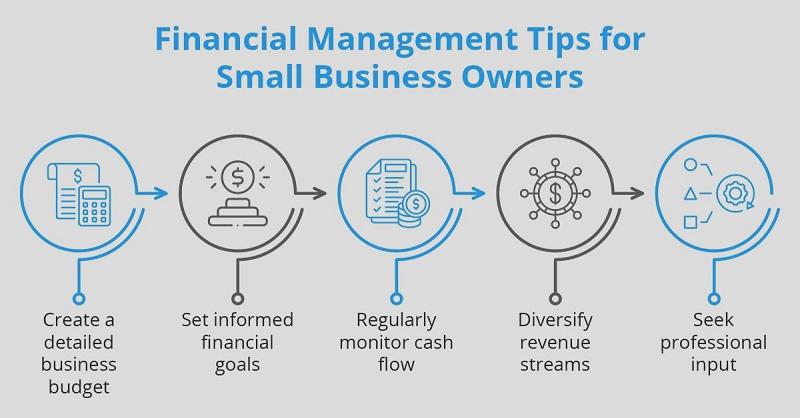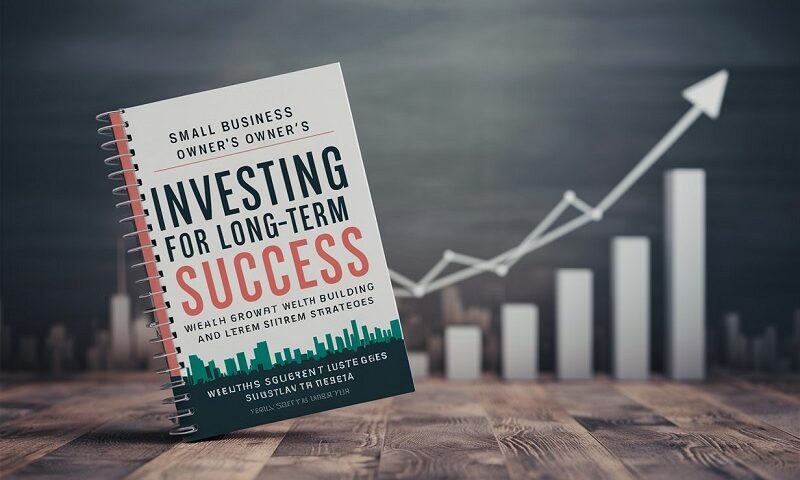
Financial Forecasting: Predicting Your Business’s Future
November 21, 2024
5 Crucial Retirement Planning Strategies for Small Business Owners
December 28, 2024Investing for Long-Term Success: Small Business Owners’ Guide to Building Wealth
Small business owners often dedicate immense time, effort, and resources to growing their businesses. While this focus is critical, ensuring long-term financial stability involves more than just reinvesting in the business. Strategic investment planning can help business owners build lasting wealth, secure their financial future, and create a diversified portfolio that mitigates risk. This guide explores how small business owners can effectively invest for long-term success and create a path to sustainable wealth.
Why Investing Matters for Small Business Owners
Many small business owners prioritize immediate operational needs over long-term financial planning. However, relying solely on the success of a business can be risky. Diversifying investments provides a safety net against uncertainties such as market downturns, economic shifts, or unforeseen challenges.
Investing ensures:
- Wealth Diversification: Reduces dependence on one income source.
- Financial Security: Builds reserves for retirement or unexpected events.
- Legacy Creation: Helps in transferring wealth to future generations.
Set Clear Financial Goals
Before diving into investment opportunities, it’s crucial to identify specific financial goals. This step aligns your investments with your personal and business aspirations.
Examples of goals include:
- Saving for retirement.
- Funding children’s education.
- Building an emergency fund.
- Expanding the business.
Using SMART goals (Specific, Measurable, Achievable, Relevant, Time-bound) can make your objectives more actionable.
Build a Strong Financial Foundation First
Investing without a stable financial base can be risky. Small business owners should first address key financial essentials:
- Emergency Fund: Maintain at least 3–6 months’ worth of personal and business expenses in a liquid account.
- Debt Management: Pay off high-interest debts before investing in riskier assets.
- Insurance Coverage: Secure adequate life, health, and business insurance.
Understand Risk Tolerance
Risk tolerance varies among individuals and depends on factors like age, financial stability, and long-term objectives. Small business owners, given their inherent business risks, may prefer conservative investments initially.
Types of investors:
- Conservative: Prioritize low-risk options like bonds or dividend stocks.
- Moderate: Combine stocks, real estate, and low-risk assets.
- Aggressive: Focus on higher-risk assets such as growth stocks or startups.
Assessing your risk tolerance ensures that your investment strategy aligns with your comfort level.
Diversify Beyond Your Business
Investing all your resources back into your business might limit growth opportunities. While reinvestment can fuel expansion, balancing it with external investments is critical for long-term wealth.
Options for diversification include:
- Stock Market Investments: Invest in index funds, ETFs, or individual stocks.
- Real Estate: Consider rental properties or real estate investment trusts (REITs).
- Retirement Accounts: Maximize tax-advantaged accounts such as IRAs or 401(k)s.
- Alternative Assets: Explore commodities, private equity, or cryptocurrency.
Diversification spreads risk across multiple asset classes, providing a cushion against market fluctuations.
Leverage Retirement Accounts
Tax-advantaged retirement accounts are a cornerstone of long-term investing for small business owners. These accounts grow tax-deferred, maximizing wealth accumulation over time.
Popular options include:
- SEP IRA (Simplified Employee Pension): Ideal for self-employed individuals.
- Solo 401(k): Allows high contribution limits for business owners without employees.
- Traditional/Roth IRA: Offers flexibility based on income and tax preferences.
Start early to take advantage of compound interest, which can significantly increase retirement savings.
Invest in Low-Cost Index Funds and ETFs
Index funds and Exchange-Traded Funds (ETFs) are excellent choices for passive investors. These options provide broad market exposure, low fees, and long-term growth potential.
Advantages include:
- Low expense ratios.
- Consistent returns that match market performance.
- Reduced need for active management.
Look for funds that align with your investment goals, such as total market or sector-specific ETFs.

Consider Real Estate Investments
Real estate can be a reliable wealth-building tool for small business owners. It offers steady cash flow, tax advantages, and long-term appreciation.
Options include:
- Residential Properties: Purchase homes to rent out or flip.
- Commercial Properties: Invest in office spaces or warehouses.
- Real Estate Crowdfunding: Pool funds with other investors to finance projects.
Diversifying into real estate can generate passive income, complementing your active business earnings.
Balance Growth and Stability
Balancing high-growth investments with stable assets is key to achieving long-term success.
High-growth options:
- Technology stocks.
- Startups or venture capital.
Stable options:
- Treasury bonds.
- Blue-chip stocks.
An ideal portfolio balances these investments based on your financial goals and timeline.
Maximize Tax Efficiency
Small business owners can leverage tax strategies to enhance their investment returns.
Tips include:
- Contribute to tax-deferred retirement accounts.
- Take advantage of tax deductions for business expenses.
- Consider municipal bonds, which are often tax-free.
- Consult a financial advisor for customized strategies.
Reducing tax liabilities allows you to reinvest more of your earnings.
Automate Your Investments
Automation simplifies the investment process and ensures consistency. Many platforms offer automated features like dollar-cost averaging, where you invest a fixed amount regularly regardless of market conditions.
Benefits of automation:
- Removes emotional decision-making.
- Builds disciplined habits.
- Reduces the impact of market volatility.
Popular platforms like Vanguard, Fidelity, and Robo-advisors like Betterment make automation accessible.

Monitor and Adjust Your Portfolio
Regularly reviewing your investments is essential to ensure they align with changing goals and market conditions.
Steps for effective portfolio management:
- Assess performance quarterly or annually.
- Rebalance to maintain desired asset allocation.
- Adjust based on life events or business changes.
Staying proactive allows you to adapt to shifts in the market while keeping your objectives on track.
Seek Professional Advice
Navigating the complexities of investing can be challenging. Financial advisors and wealth managers can provide tailored strategies, helping you optimize returns and minimize risks.
When choosing an advisor, ensure they are:
- Fee-Only: Avoid commission-based advisors to prevent conflicts of interest.
- Certified: Look for credentials like CFP (Certified Financial Planner).
- Experienced with Small Businesses: Understands your unique needs.
Plan for Succession and Estate
Estate planning ensures a smooth transfer of wealth and protects your assets. Small business owners should prepare:
- A will or trust.
- Succession plans for the business.
- Power of attorney and healthcare directives.
Proper planning minimizes taxes and ensures your legacy is preserved for the next generation.
The Power of Patience and Consistency
Investing is a marathon, not a sprint. Consistent contributions and long-term thinking can yield significant results over time. Resist the urge to chase short-term gains or panic during downturns.
Key principles:
- Stay disciplined.
- Maintain a diversified portfolio.
- Focus on long-term growth over immediate returns.
FAQs: Common Questions About Investing for Small Business Owners
Q: How much should small business owners invest outside their business?
A: Aim to allocate at least 20–30% of profits toward external investments, depending on cash flow and financial goals.
Q: What are the safest investment options for small business owners?
A: Low-risk options include government bonds, high-yield savings accounts, and dividend-paying stocks.
Q: Can I invest through my business entity?
A: Yes, certain investments, like SEP IRAs or real estate, can be made through business accounts to optimize tax benefits.
Q: How can I start investing with limited capital?
A: Begin with low-cost index funds, ETFs, or micro-investing platforms like Acorns or Stash.
Q: Is it better to reinvest in my business or diversify?
A: Balance is key. While reinvesting supports growth, diversification ensures long-term security.
Q: How do I find the best financial advisor?
A: Look for fiduciary advisors with experience working with small business owners, and verify their certifications.
Conclusion
Investing for long-term success requires thoughtful planning, disciplined execution, and a commitment to diversification. For small business owners, balancing business reinvestment with external investments is crucial for financial security and sustainable wealth growth. By setting clear goals, leveraging tax-efficient strategies, and seeking professional guidance, small business owners can confidently navigate the path to lasting financial success.
Resources
- Learn More About Tax-Advantaged Retirement Accounts
- Explore Real Estate Crowdfunding Options
- Understand Risk Tolerance in Investing
DISCLAIMER: The information in this article is for informational purposes only and is not meant to take the place of legal and accounting advice.




